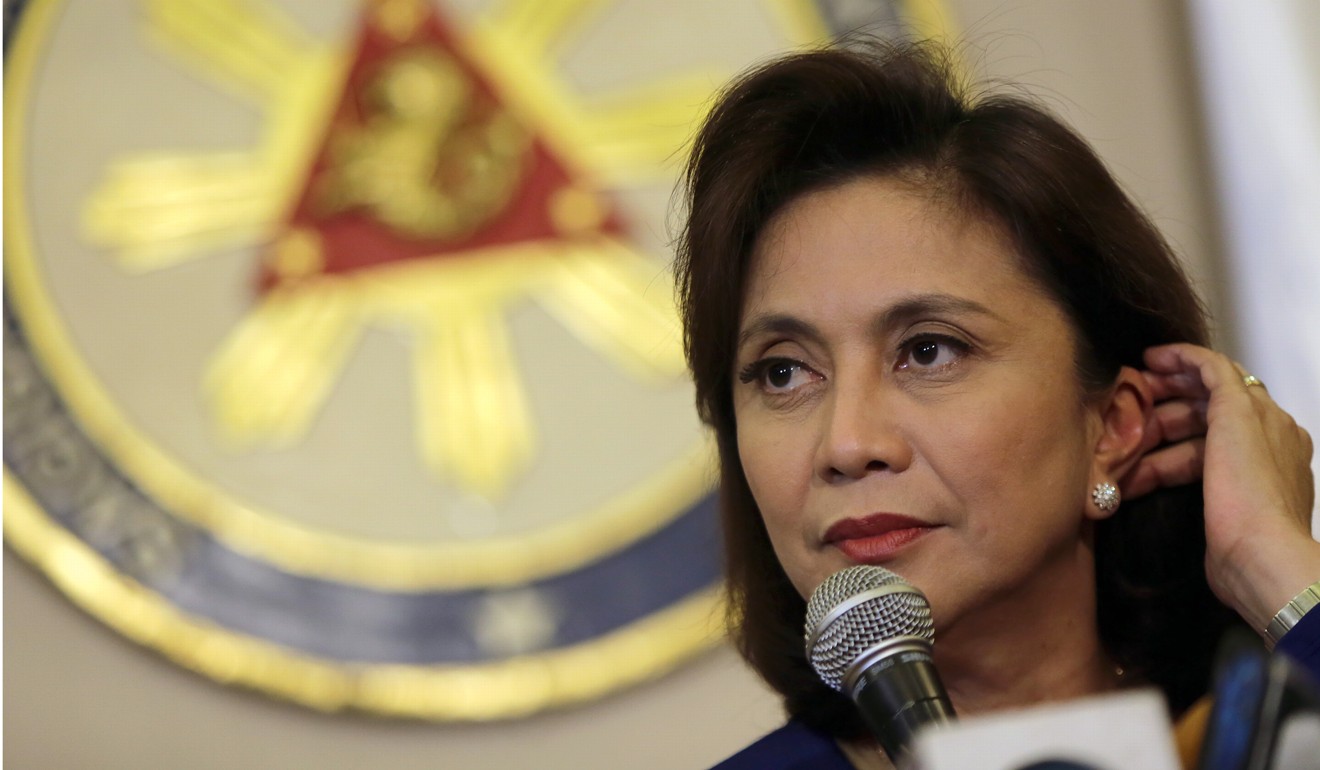
Philippine midterm elections: Duterte must find an heir – or face the music on his drug war
- History hasn’t been kind to recent Philippine presidents. If Duterte is to avoid a similar fate he must succeed where they failed – by ensuring his anointed successor takes power.
- Step forward daughter Sara and long-time aide Bong Go
And that is the prospect of facing political persecution, if not legal prosecution, for real and perceived misdeeds once he leaves office in 2022.
Thus, for Duterte, the midterm elections in May are about finding a successor that will protect him against the very fate that bedevilled his predecessors.
Crucially, his daughter and the current Davao City mayor, Sara, and Bong Go, his long-time aide, have both emerged as formidable contenders.
There are few countries in the world where political transitions are as treacherous for the incumbent president.

Over the past two decades, former Filipino presidents have faced: imprisonment (Joseph Estrada); protracted pre-trial incarceration (Gloria Macapagal-Arroyo); and the constant threat of criminal investigations and non-stop political harassment (Benigno Aquino).
For the past half-century, no Filipino president has been able to ensure his or her anointed successor takes power.
Duterte is the Putin of Asia. Maria Ressa is the proof
This is fundamentally because of the high anti-incumbency bias of the Philippine electorate, who tend to swing wildly between opposite types of statesmen.
This partly explains why the Southeast Asian country’s contemporary history is one of cyclical shifts between two types of leaders – technocratic reformists and populist strongmen.
Among all contemporary Filipino presidents, Duterte seems most vulnerable to political reprisals, if not legal punishment, once he steps down from power.

Though the Philippines recently withdrew its membership of the International Criminal Court (ICC), senior officials could still face, under Article 127.2 of the Rome Statute, investigations and potential prosecution amid the reported death of thousands of suspected drug dealers under Duterte’s scorched-earth “war on drugs”.
The ICC applied the same rule when Burundi became the first country to withdraw from the intergovernmental organisation amid an ongoing investigation into charges of crimes against humanity.
Taho-gate has stained Duterte’s Philippines-China love affair
Duterte’s authoritarian ways, including his imprisonment and harassment of opposition senators and the ongoing crackdown on hostile media outlets and personalities, have crystallised a determined opposition, which is composed of liberal politicians, human rights activists, Catholic Church leaders, and progressive groups.
Theoretically, the opposition can tap into the anti-incumbency bias of the electorate in the next presidential cycle. This opens the possibility for a hostile successor, who could not only rescind the Philippines’ withdrawal from the ICC, but also help investigate and even prosecute officials in the Duterte administration.

That the de facto leader of the opposition is Vice-President Leni Robredo only reinforces fears of political reprisals. Leni could run for the top office and constitutionally replace Duterte under extreme circumstances, including incapacity or extra-constitutional displacement of the incumbent, as was the case in 1986 (against Ferdinand Marcos) and 2001 (against Joseph Estrada).
This is why it’s crucial for Duterte to cement an imperial presidency and, accordingly, lay down the foundation for a favourable political transition once he steps down from office in 2022.
By all accounts, Duterte’s allies are set to dominate the forthcoming elections. This is no surprise since historically administrations leverage the president’s popularity as well as the vast apparatus of the state to edge out the opposition.
To the Philippine Catholic Church, Duterte is a modern-day Henry VIII
The latest surveys suggest Duterte’s key allies are set to win a lion’s share of the seats in the powerful Senate, which has, so far, acted as a check, albeit inchoate, on the executive’s excesses.
Among the opposition, only one candidate, Manuel Roxas, a former top-ranking senator and presidential candidate, has a good chance of gaining a seat. Other seats will probably go to independent-leaning candidates such as Grace Poe, also a former presidential candidate. The midterm elections, so far, have created two major winners. One is Duterte’s long-time chief aide, Bong Go, who has experienced a meteoric rise in popularity. From virtual obscurity in 2016, he is now among the top three candidates for the 12 Senate seats up for grabs.

Once he becomes a senator, Bong Go is expected to act as the chief liaison between the Senate and the Malacanang presidential palace, ensuring that Duterte’s legislative agenda will get through.
Among Duterte’s most ambitious plans is to revise the constitution and create a new political system that reflects his preferences and interests. He may soon have the super-majority support in the Philippine legislature to fulfil his goal.
The other major winner of the elections is his daughter, Sara, the founder of what is now the de facto ruling party, Hugpong ng Pagbabago (HNP).
As Muslims vote on self-rule in Philippines, Duterte’s legacy is in God’s hands
Though she shunned a run for the Senate in favour of mayoral re-election in Davao, Duterte’s daughter is largely seen as the most prominent figure in the ongoing elections, leading the rallies and campaign sorties of the administration.
As Duterte’s spokesman Salvador Panel bluntly put it, “In fact, there is even a movement launching her to be the next president.” If the current political momentum persists, one could imagine a formidable Sara-Bong Go ticket to succeed Duterte and protect his legacy.
In the absence of a robust challenge from the opposition, the midterm elections could very well hand Duterte a crucial opportunity to consolidate power unlike any of his contemporary predecessors.
The stakes couldn’t be any higher, for the upcoming elections could forever change the fate of the Philippines’ fragile democracy. ■
Richard Heydarian is the author of The Rise of Duterte

